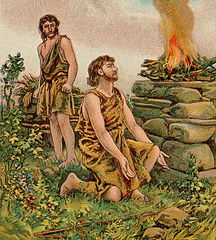Cheleb: The Finest
Seeing grace and mercy in the Old Testament story of Cain and Abel.
“For I am the Lord, I change not” (Malachi 3:6).
God has changed. Or at least that seems to be what many are teaching in our day. There are denominations that teach that the God of the Old Testament is different from the God of the New Testament holding that the old God was mean and wrathful, but the new God is loving and full of mercy. One theory goes so far as to state that God has matured from a juvenile attitude to having a more adult disposition.

Image: Wikimedia Commons
It is certainly true that God demonstrates awesome power in the Old Testament. Yet it’s fair to say what happened in ancient days will be mild compared to what He is going to do in the end of days, when the wrath of God is poured out and entire segments of the world’s population will cease to exist! This demonstrates either a God who cannot make up his mind, or a changeless God of perfect continuity.
I will assume that if you are reading the Pneuma Review, you agree with Scripture that God is changeless. This conjecture being true, then the grace, mercy, and compassion “others” claim are absent from in the Old Testament must, in fact, be there. Such is the case in the story of Cain and Abel.
“And in process of time it came to pass, that Cain brought of the fruit of the ground an offering unto the Lord (Gen.. 4:2).” This sounds reasonable. It even sounds like Cain had a good head on his shoulders to have decided to bring an offering to the Creator.
Yet the key to understanding the sibling rivalry between Cain and Abel is found in the next verse.
And Abel, he also brought of the firstlings of his flock and the fat thereof. And the Lord had respect unto Abel and to his offering.
The Hebrew word for offering is minchah. It is not merely any offering, but a specific offering. This comes to a fuller understanding in the tabernacle period, but there are elements we can appreciate in Cain and Abel’s offering (See Pneuma Review Vol 2 No 2 Spring 1999 for more explanation on this and all the Levitical sacrifices).
Whatever acts of justice God did in ancient days are going to seem mild compared the wrath that will be poured out in the last days.
Category: Biblical Studies, Spring 2000


